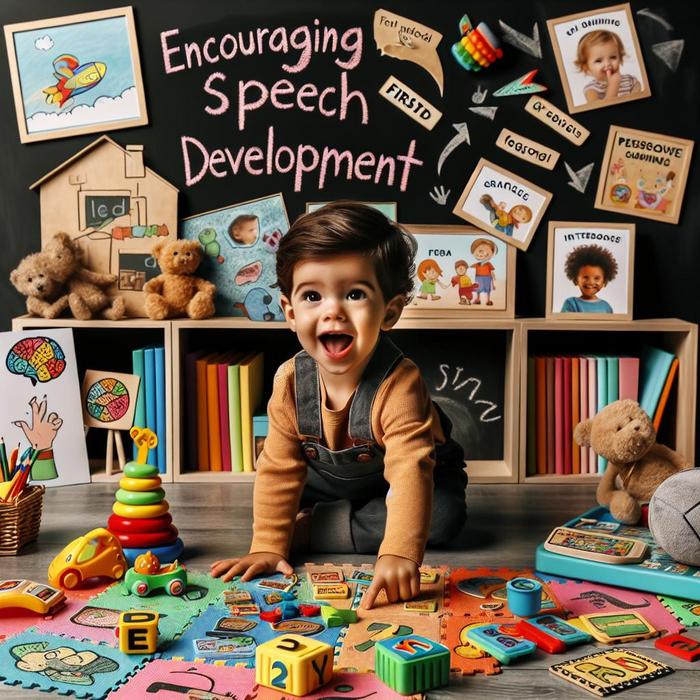Engaging Games to Foster Speech Development in Toddlers
Developing your child’s speech is an exciting journey filled with giggles, amusing sounds, and delightful first words. Not only is it a heart-warming experience, but speech development also plays a vital role in your child’s cognitive and social growth. Here are a few entertaining games and activities designed to stimulate early communication:
Fun with Flashcards
Flashcards are an excellent tool for encouraging your toddler’s speech development. Flashcards with images of familiar objects or animals can trigger the child’s response, aiding in their vocabulary development.
Interactive Storytime
Storytime can be an enjoyable activity for your toddler if introduced as an interactive session rather than a passive narrative. Ask questions about the imagery or characters, encouraging your child to express their thoughts. This not only improves their language skills but also aids their comprehension abilities. If you’re looking for ways to establish a storytime ritual, you can learn more here.
Introducing Music and Rhymes
Music is a powerful tool for your toddler’s speech development. The rhythm and melody of songs can make learning new words and sounds enjoyable for your child. You can learn more about the benefits of musical exposure to babies here.
Benefits of Puppet Play
Puppet play can be an engaging activity that stimulates your toddler’s imagination and language skills. Acting out stories or daily routines with puppets can inspire your child to communicate more effectively.
Here are a few more speech development tips:
- Simplify your language to match your child’s level but keep sentences grammatically correct.
- Opt for games and activities that require interaction and communication.
- Always respond to your child’s attempts to communicate, encouraging further interaction.
- Praise your child’s efforts. This encourages them to keep trying.
When to Seek Help?
Every child develops at their own pace. However, if you’re worried about your child’s speech development, it’s always best to seek professional advice. You can find useful information and resources on forums such as Reddit.
Remember, early detection of any developmental delays can lead to more effective intervention, thereby ensuring the best outcome for your child. You can find more engaging games and toddler activities for speech learning here.
Taking the Next Step
As you continue your speech development journey with your toddler, remember to stay patient and keep the activities fun and engaging. In future posts, we will delve deeper into the fascinating world of early communication and share more tips and activities for your child’s speech development.
Sign Language Basics
Teaching your toddler basic sign language can be an excellent supplementary tool for their speech development. Simple signs for everyday needs and emotions can help your child communicate effectively before they can speak full sentences. This technique can reduce frustration while encouraging them to learn how spoken language corresponds to their needs. You can check out some speech therapy techniques for toddlers here.
Label the World
A simple and effective activity can be to label objects around the house. This familiarity can make it easier for the child to associate words with the items they see daily. Naming each object as you or your toddler points to them will also help your child associate the image with its corresponding term.
Story Games
A more advanced form of interactive storytelling, story games allow your toddler to add their ideas into the narrative, expanding their vocabulary and improving their language abilities. Start a story and ask your child to fill in the blanks, making up situations and introducing new characters. Not only does this strengthen your child’s language skills, but it also fosters creativity.
Fun with Facial Expressions
By encouraging your child to mimic and understand different facial expressions, you’re helping them understand a crucial part of communication—nonverbal cues. Making faces and asking your toddler to guess your expression can be turned into an engaging activity. Plus, it teaches your toddler how expressions correspond to various emotions.
Setting a Routine
Turning everyday activities into speech development opportunities can make a world of difference. Simple activities like mealtime, bath time, or grocery shopping can be transformed into mini language lessons. Remember to narrate what you’re doing and encourage your toddler to participate in the conversation.
Introducing Auditory Games
Introducing auditory games such as ‘Simon Says’ can be an entertaining way of improving your toddler’s listening and comprehension skills. It’s a simple game with powerful benefits, and best of all, it can be played anywhere and anytime.
Speech therapists often use fun activities to foster language development in children. A good resource for such games can be found here.
Mixing Play with Learning
It’s essential to make learning feel like play, allowing your toddler to enjoy the process and explore communication in a stress-free environment. Try to incorporate elements of storytelling, singing rhymes, or any activity your toddler likes, adding a language learning spin to it. You can get some inspiration for speech therapy games for toddlers and preschoolers here.
Fostering Creativity and Imagination
Lastly, remember that fostering creativity and imagination is just as important as concentrating on vocabulary and speech development. Encourage your toddler to create their stories, express their thoughts, and imagine new scenarios.
Interested in finding more speech therapy activities? Take a look here.






